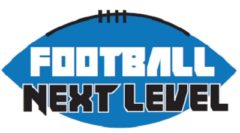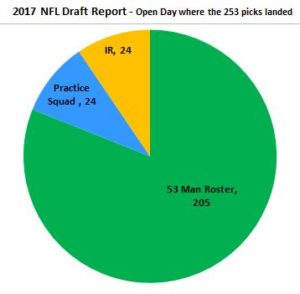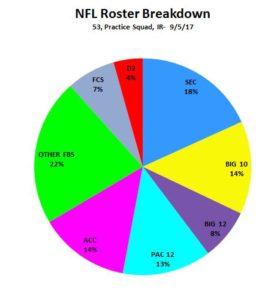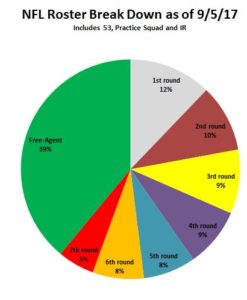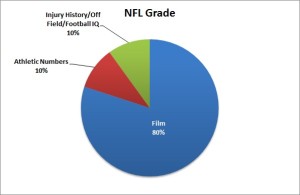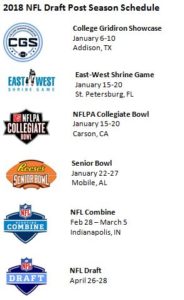Tag: College Football
Why some NFL prospect make it and why others do not?

By Justin VanFulpen
When the NFL regular season started 39% of NFL rosters were made up of undrafted players. Every year when it comes to who makes the 53 man roster you will see teams that cut draft picks and keep undrafted players. Being around the NFL business for almost 20 years if different aspects from covering it, to doing player personal to representing players, there is one thing that is hard to measure. That is the player’s true motivation. True there can be many factors on why a NFL draft pick doesn’t make it but to me one big factor is that it comes down to do two different types of prospects – Players who goal is to make it to the NFL and players who goal is to play in the NFL.
For NFL scouts and coaches this is hardest thing to figure out. Because people can say and do all the right thing but the really questions is what is the true motivation. All NFL prospects have good film and are good athletes or wouldn’t be considered a prospect.
Player who goal is to make it to the NFL – Their ending goal in football is that they have reached the highest level and it is a finishing point not a starting point in their football career. Maybe they are doing it because it seems to be the cool thing to do, will make their parents, family and friends proud. But it is where the goal stops. This prospect is less likely to do the extra things to maintain his career or roster spot.
Player who goal is to play in the NFL – Getting drafted or signed is start part of the goal and not the end of the goal, true they are excited to see a dream fulfilled but know that now the work beings to reaching their goal of a long NFL career. This prospect is more likely to be willing to do the extra things to maintain his career or roster spot.
Only a player truly knows what type of prospects he is and at the end of the day it is his career but the job of the people drafting and signing players is to try to figure out what they players true motivation is.
Declaring early for NFL Draft – Is it worth the risk?
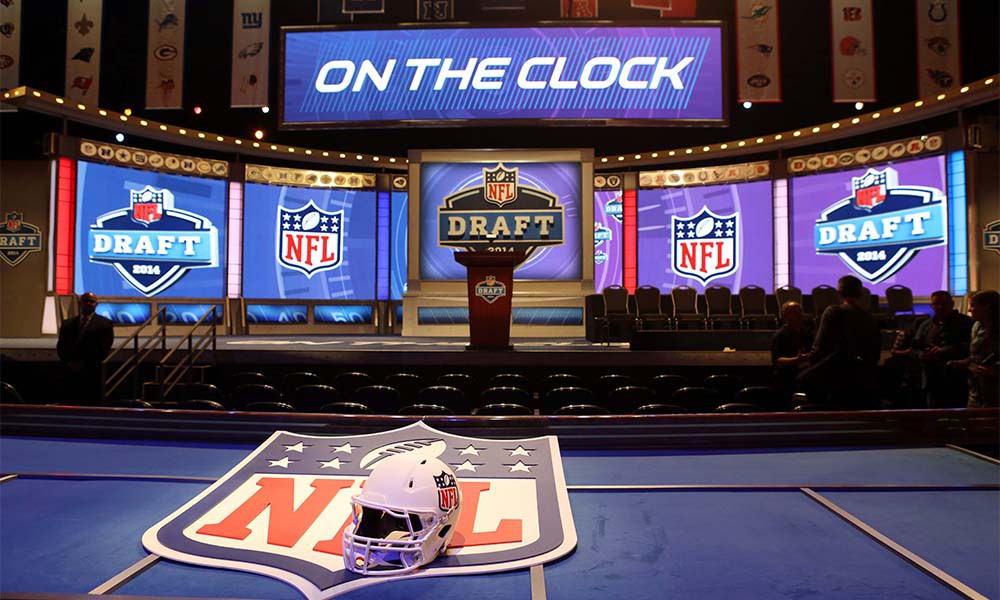 By Justin VanFulpen
By Justin VanFulpen
This time of the year in college football, the mock drafts start coming out and people start talking about what players will declare early. But just because some on the internet is saying that this player should declare early or someone close to the player telling him that he should leave school early might not know all the facts.
1. NFL Scouts weren’t allowed to scout underclassmen, until this season when the rule was changed. But with this rule change this year with the new agreement with the AFCA and NFL that took effect, where school gave the scout a list of 5 possible players that could declare that they were allowed to get info on. Scouts do look at the guys that they know for sure will be coming out early, but their main focus is the senior prospects. The underclassmen that aren’t general accepted as a 1st round pick there is rarely any work done on them during the season.
2. Underclassmen aren’t allowed at post season all-star games. 6 years ago with the NFLPA started the NFLPA Collegiate Bowl they were going to challenge the NFL rule and did allow one underclassmen in the game. That caused the NFL teams not to send a single scout to that all-star game. Because of that the NFLPA has only allowed seniors in their all-star game for then on. As we saw in the 2013 NFL Draft All-Star games are a big part of the process where OT Eric Fisher, Central Michigan went from a late first rounder all the way up to the number one overall pick because of his play at the Senior Bowl.
3. NFL Combine – First official time NFL scouts can talk to underclassmen. Just because a prospect has declared early doesn’t automatically get him an invite to the NFL combine. So if a prospect is not invited then really the first time a scout get to talk with a prospect is at his school Pro Day.
4. NFL Draft Advisory Board – The board is composed of general managers and personnel directors from a number of NFL teams, along with the directors of the NFL’s two scouting combines, BLESTO and National. A prospect can ask for their assessment on where he is projected to get drafted. The board will return their assessment of the prospect with three possible grades – first round, second round, or neither, which means that the board advises the player to stay in school. The school can get a hold of the NFL Draft Advisory Board or the prospect can contact the NFL Player Personnel Department directly.
5. The 2017 NFL Draft included 95 underclassmen and another eight who entered the draft having earned a degree but still with NCAA playing eligibility. 67 underclassmen were drafted, leaving 28 (30 percent) not drafted. The 2016 NFL Draft 30 of 96 underclassmen were not chosen (31 percent).
Every prospects situation is different when thinking about declaring early for the NFL Draft but each prospect should get as much information as possible in regards to leaving school early for the NFL Draft.
2017 NFL Draft Report – What happened to the 253 draft picks
NFL Roster Breakdown
NFL Roster Breakdown by Draft Position
Impact of Social Media and NFL Draft Prospects

By Justin VanFulpen
In the past few years social media has exploded and more and more corporate America is reviewing candidates for jobs social media profiles and making hiring decisions based on what they find on someone’s Facebook, Twitter, Instagram, Snapchat, etc. This has now made its way to the NFL Draft process and it is something some NFL teams are taking to a scientific measurable level.
NFL teams are creating a “social media profile” on NFL draft prospects as well as their regular football profile that included football skills on film, medical and character. This social media profile is looking to see what the prospects are tweeting about, what they are posting, etc. Things that they are looking for is how much does the prospect post something about football? Are there posts about drugs, weapons, or alcohol? Does the prospect post things degrading women? Some NFL teams will use pie graphs to show the percentage of things that the prospect posts about.
How far are NFL teams going back to research? Well one NFL team that I talked to said that they looked all the way back at a tweet QB Jameis Winston had tweeted in high school. Yes, high school.
“Our job now as scouts is not just see if the guy can play but every aspect of his life and that now includes his social media and what he post, as what his post is most likely what is important to him as a person. We are now taking it to a level of measuring that.” said one NFL scout.
As we saw play out with former Ole Miss and current Miami Dolphins OT Laremy Tunsil social media was hacked and a video and screen shot of texts were posted. Tunsil’s fall from the draft’s projected No. 3 pick to No. 13 cost him at least $10 million in guaranteed signing bonuses. True Tunsil’s social media profiles we hacked by what was believed someone who Tunsil had given access to his profiles in the past.

With this social media analytics and data what NFL teams are trying to find out is, one does the prospect love football and two is he a good guy and can we trust him. Everyone need to know what they post on social media could be viewed differently by different people. True what someone post on social media doesn’t give the full picture but it is a tool that NFL teams are trying to use to make better personal decisions.
Social media can be used for positives things like building one’s brand, marketing, engaging with fans, supporting causes and much more but it can have a negative effect as well and once something is posted it can’t be taken back even if deleted because with the notoriety someone will screen shot it and it will live on.
Breakdown of what NFL Draft Grades are made up of per NFL Scouts
Film (80%) – Your level of competition and how you played against the best level of competition you faced that year. Each NFL team will view around 3 full games of your current season normally against who is the best competition. This also includes if a prospect plays in any of the college football all-star games.
Athletic Numbers (10%) – Height, Weight, Speed. Teams are looking at the film first and then see if the prospect checks off the box in the athletic numbers per the position.
Injury History/Off Field/Football IQ (10%) – Any major injuries, anything major off the field, love of the game, film study. Scouts are check social media, talking to high school coaches, strength coaches, academic advisors, current coaches as they try to find out as much information on the prospect on and off the field.
2018 NFL Draft Post Season Schedule
When Should a College Football Coach Hire an Agent?
/cdn.vox-cdn.com/uploads/chorus_image/image/53880529/IMG_20170324_133741.0.jpg)
By Justin VanFulpen
Then simple answer is whenever he wants to or feels he needs to. A coach can negotiate his own contract and he can do all the other things an agent helps with. College Football coaches are busy and we all have 24 hours in a day so the question comes does having an agent free up some time? Does the agent bring other value to the coach? In terms of other service the agent provides or even just being a confidential sounding board.
If I would hire someone to cut my lawn, it is not the fact that I can’t do it, it is the fact I would rather do something else with my time. This is the same principle here, a coach can know the market place in terms of salaries, contracts, opening, and more but it might be helpful to have someone else there to do some of the work as well.
Also with College Football became even more of a big business on all levels it could be good to have someone to be your voice or even play the “bad cop” role with administration or whoever is in charge of the contracts. But also there is much more that coaches use their agent for then just getting a deal done and a contract negotiated.
The question I have gotten in the past is “what is the downside” and the answer is there really isn’t one, you as the coach empower the agent to negotiate or inquire about a job or other service so a reputable agent really could only increase your value, add more time back to you or enhance what you are already doing. Another thing I have heard is “I don’t want an agent to ruin the reputation that I have built so far in my career” and to that I say at the end of the day you are the boss the agent works for you so you guys should have communicated on how you as the coach want things done and it if it doesn’t work out that is when you terminate the relationship.
